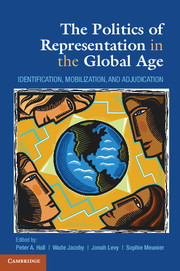Book contents
- Frontmatter
- Dedication
- Contents
- Abbreviations
- Acknowledgments
- Foreword
- 1 Introduction
- Part I The Politics of Interest Representation
- Part II Responding to the Challenges of a Global Era
- Part III New Institutional Settings for Representation
- 7 Blurring Political and Functional Representation
- 8 Altering Politics
- 9 Private Regulation (and Its Limitations) in the Global Economy
- Short Biographies of Editors and Contributors
- Index
- References
9 - Private Regulation (and Its Limitations) in the Global Economy
Published online by Cambridge University Press: 05 June 2014
- Frontmatter
- Dedication
- Contents
- Abbreviations
- Acknowledgments
- Foreword
- 1 Introduction
- Part I The Politics of Interest Representation
- Part II Responding to the Challenges of a Global Era
- Part III New Institutional Settings for Representation
- 7 Blurring Political and Functional Representation
- 8 Altering Politics
- 9 Private Regulation (and Its Limitations) in the Global Economy
- Short Biographies of Editors and Contributors
- Index
- References
Summary
Globalization, with its volatile mix of economic opportunity and social disruption, is redefining the boundaries of the firm, transforming the interests associated with global production, and shaping the working conditions of the millions of individuals employed in today's global supply chains. The world of global supply chains links thousands of firms, large and small, across multiple cultural and political boundaries. The diffusion of global supply chains in an array of different industries – apparel, electronics, footwear, food, toys, and so on – has provided developing countries with much-needed investment, employment, technology, and access to international markets.
As such, the integration of producers located in developing countries into global supply chains is having a catalytic and transformative effect on local economies, allowing poor countries finally to achieve their long sought-after goal of development (Collier and Dollar 2002; Moran 2002). At the same time, however, the social and environmental consequences of these changes have provoked significant controversies over the role of global brands and their local suppliers, often seen as exploiting developing countries’ low wages and weak social and environmental regulation to produce low-cost goods at the expense of local workers’ welfare. In fact, child labor, hazardous working conditions, excessive working hours, and poor wages plague many workplaces in the developing world, creating scandal and embarrassment for the global companies that source from these factories and farms (Verité 2004; Pruett 2005; Connor and Dent 2006; Kernaghan 2006).
- Type
- Chapter
- Information
- The Politics of Representation in the Global AgeIdentification, Mobilization, and Adjudication, pp. 200 - 228Publisher: Cambridge University PressPrint publication year: 2014
References
- 1
- Cited by



